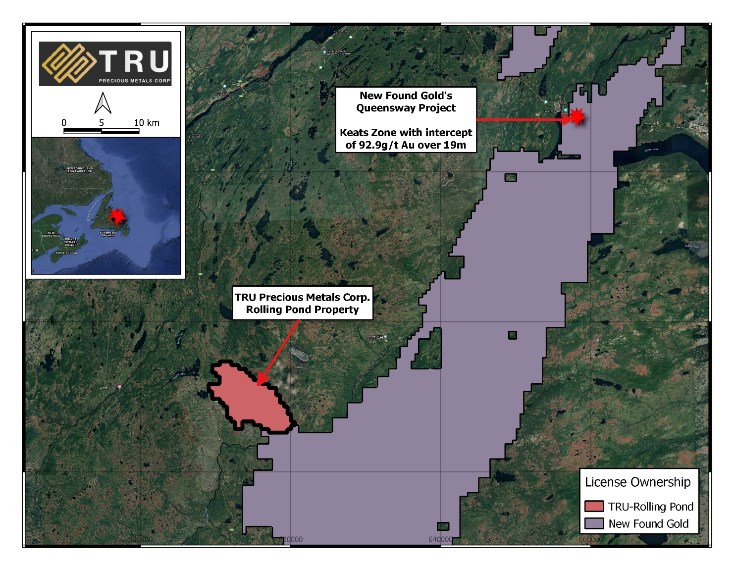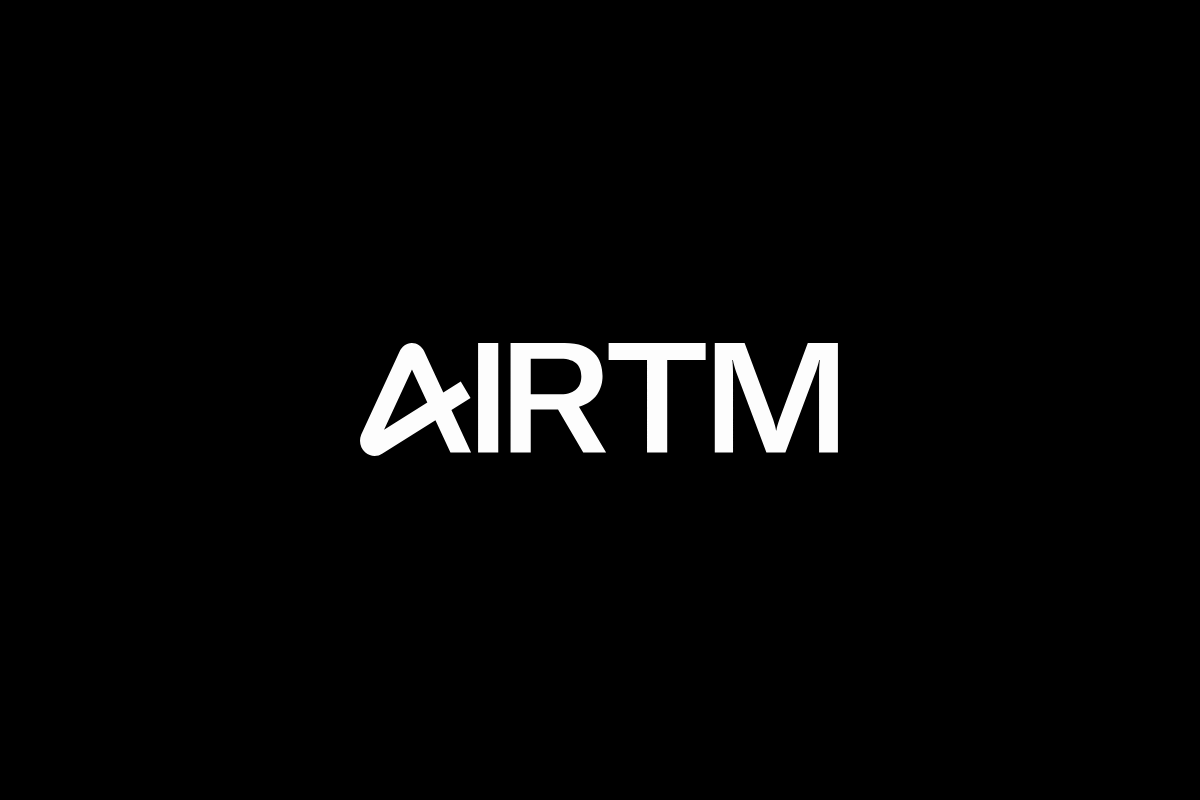Fintech
TRU Precious Metals Completes Soil Sampling Program at Its Rolling Pond Property Bordering New Found Gold’s Queensway Project

Fredericton, New Brunswick–(Newsfile Corp. – June 17, 2021) – TRU Precious Metals Corp. (TSXV: TRU) (OTCQB: TRUIF) (FSE:706) (“TRU” or the “Company”) is pleased to announce that it has completed a property-wide soil sampling program at its Rolling Pond Property in the Central Newfoundland Gold Belt. The Rolling Pond property is contiguous with the south end of New Found Gold’s Queensway project. New Found Gold reported drill intercepts on May 21, 2021 at the Queensway Project of 146.2 grams per tonne gold over 25.6 meters.[1]
The completed geochemical surveying program represents TRU’s first phase of field work at the Rolling Pond property and consisted of extensive and detailed sampling (684 samples were collected). The sampling covered the large hydrothermal and quartz breccia system, which has been identified over a 1.2 km strike length but has never been subjected to a systematic soil geochemical survey. The sampling was positioned to expand upon a known soil geochemical anomaly near the south-central area of the property where a coincident multi element soil anomaly has returned gold values from 5 parts per billion (ppb) to 142ppb, one of two gold anomalous areas spanning a 500m length. The samples are being submitted to Eastern Analytical of Springdale, NL for gold fire assay and 34 element ICP geochemical analysis. Eastern Analytical is an independent accredited assay lab that conforms to requirements of ISO/IEC (International Organization for Standardization/International Electrotechnical Commission) 17025.
Figure 2: TRU Precious Metals Rolling Pond Soil Sample Location
To view an enhanced version of Figure 2, please visit:
https://orders.newsfilecorp.com/files/5993/87859_0cd23d8114ff892e_002full.jpg
TRU Co-Founder and CEO, Joel Freudman, commented, “We are excited to announce the completion of our first phase of work at Rolling Pond. Completing this detailed geochemical survey is a cost-effective way to provide the Company with greater technical data on this large target area and assists in facilitating guidance for our next phases of groundwork. Rolling Pond, being next door to New Found Gold’s Queensway Property, provides TRU with an advantageous access point to the prospective geology of that area. We remain encouraged by historical findings that the nature and style of mineralization at the Rolling Pond Property appears similar to that of New Found Gold’s and thus look forward to the results from this program.”
Barry Greene, P.Geo. is a qualified person as defined by National Instrument 43-101 and has reviewed and approved the contents and technical disclosures in this press release. Mr. Greene is a director and officer of the Company and owns securities of the Company.
About TRU Precious Metals Corp.
TRU has assembled a portfolio of 5 gold exploration properties in the highly prospective Central Newfoundland Gold Belt. The Company has an option with a subsidiary of TSX-listed Altius Minerals Corporation to purchase 100% of the Golden Rose Project, located along the deposit-bearing Cape Ray – Valentine Lake Shear Zone. TRU also owns 100% of the Twilite Gold Project, located along the same Shear Zone, and 3 under-explored properties including its Rolling Pond Property (under option) bordering New Found Gold Corp.’s high-grade Queensway Project. TRU’s common shares trade on the TSX Venture Exchange under the symbol “TRU”, on the OTCQB Venture Market under the symbol “TRUIF”, and on the Frankfurt exchange under the symbol “706”.
TRU is a portfolio company of Resurgent Capital Corp. (“Resurgent”), a merchant bank providing venture capital markets advisory services and proprietary financing. Resurgent works with promising public and pre-public micro-capitalization Canadian companies.
For further information about TRU, please contact:
Joel Freudman
Co-Founder, President & CEO
TRU Precious Metals Corp.
Phone: 1-855-760-2TRU (2878)
Email: [email protected]
Website: www.trupreciousmetals.com
To connect with TRU via social media, below are links:
Facebook
https://www.facebook.com/TRU-Precious-Metals-Corp-100919195193616
Twitter
https://twitter.com/corp_tru
LinkedIn
https://www.linkedin.com/company/tru-precious-metals-corp
YouTube
https://www.youtube.com/channel/UCHghHMDQaYgS1rDHiZIeLUg/
Cautionary Statements Regarding Forward-Looking Information
Neither TSX Venture Exchange nor its Regulation Services Provider (as that term is defined in policies of the TSX Venture Exchange) accepts responsibility for the adequacy or accuracy of this release.
Information in this press release relating to third-party mineral exploration properties are from sources believed to be reliable, but that have not been independently verified by TRU. Certain historical technical information herein relating to Rolling Pond Property has been supplied by the optionor of this property and has not been independently verified by TRU.
This press release contains certain forward-looking statements, including those relating to exploring the Company’s mineral exploration properties and the prospectivity and mineralization of the Company’s properties. These statements are based on numerous assumptions regarding the execution and success of exploration plans that are believed by management to be reasonable in the circumstances, and are subject to a number of risks and uncertainties, including without limitation: mineralization hosted on adjacent and/or nearby properties is not necessarily indicative of mineralization hosted on the Company’s properties; the exploration potential of the Company’s properties and the nature and style of mineralization at same; risks inherent in mineral exploration activities; volatility in financial markets, economic conditions, and precious metals prices; challenges in attracting and retaining qualified personnel; and those other risks described in the Company’s continuous disclosure documents. Actual results may differ materially from results contemplated by the forward-looking statements herein. Investors and others should carefully consider the foregoing factors and should not place undue reliance on such forward-looking statements. The Company does not undertake to update any forward-looking statements herein except as required by applicable securities laws.
To view the source version of this press release, please visit https://www.newsfilecorp.com/release/87859
Powered by WPeMatico
Fintech
Fintech Pulse: Your Daily Industry Brief (Chime, ZBD, MiCA)

As we close out 2024, the fintech industry continues to deliver headlines that underscore its dynamism and innovation. From IPO aspirations to groundbreaking regulatory milestones, today’s updates highlight the transformative power of fintech partnerships, regulatory evolution, and disruptive technologies. Here’s what you need to know.
Chime’s Quiet Step Toward Public Markets
Chime, the U.S.-based financial technology startup best known for its digital banking services, has taken a significant step by filing confidential paperwork for an initial public offering (IPO). As one of the most valuable private fintechs in the U.S., Chime’s move could potentially signal a renewed appetite for fintech IPOs in a market that has been cautious following fluctuating valuations across the tech sector.
With a valuation that reportedly exceeded $25 billion in its last funding round, Chime’s IPO could set a new benchmark for the industry. Observers note that its strong customer base and revenue growth may make it an appealing choice for investors seeking to capitalize on the digital banking boom. However, the timing and success of the IPO will depend on broader market conditions and the regulatory landscape.
Source: Bloomberg
ZBD’s Pioneering Achievement: EU MiCA License Approval
ZBD, a fintech company specializing in Bitcoin Lightning network solutions, has made history by becoming the first to secure an EU MiCA (Markets in Crypto-Assets Regulation) license. This landmark approval by the Dutch regulator positions ZBD at the forefront of compliant crypto-fintech operations in Europe.
MiCA, which aims to harmonize the regulatory framework for crypto-assets across the EU, has been a focal point for industry players aiming to establish legitimacy and expand their offerings. ZBD’s achievement not only validates its operational rigor but also sets a precedent for other fintech firms navigating the evolving regulatory landscape.
Industry insiders view this as a strategic advantage for ZBD as it broadens its footprint in Europe. By leveraging its regulatory approval, the company can accelerate its product deployment and establish trust with institutional and retail users alike.
Source: Coindesk, PR Newswire
The Fintech-Credit Union Synergy: A Blueprint for Innovation
The convergence of fintechs and credit unions continues to reshape the financial services ecosystem. Collaborative initiatives, such as the one highlighted in the recent partnership between fintech innovators and credit unions, are proving to be a potent force in delivering tailored financial solutions.
This “dream team” approach allows credit unions to leverage fintech’s technological expertise while maintaining their community-focused ethos. Key areas of collaboration include digital payments, personalized financial management tools, and enhanced loan processing capabilities. These partnerships not only enhance member engagement but also enable credit unions to remain competitive in an increasingly digital-first financial environment.
Industry analysts emphasize that such collaborations underscore a broader trend of traditional financial institutions embracing fintech-driven solutions to bridge service gaps and foster innovation.
Source: PYMNTS
Tackling Student Loan Debt: A Fintech’s Mission
Student loan debt remains a pressing issue for millions of Americans, and a Rochester-based fintech aims to offer relief through its cloud-based platform. This innovative solution is designed to simplify loan management and provide borrowers with actionable insights to reduce their debt burden.
The platform’s features include repayment optimization tools, personalized financial education, and seamless integration with loan servicers. By addressing the complexities of student loan management, this fintech is empowering borrowers to make informed decisions and achieve financial stability.
As the student loan crisis continues to evolve, solutions like this highlight the critical role fintech can play in addressing systemic financial challenges while fostering financial literacy and inclusion.
Source: RBJ
Industry Implications and Takeaways
Today’s updates underscore several key themes shaping the fintech landscape:
- Regulatory Milestones: ZBD’s MiCA license approval exemplifies the importance of regulatory compliance in unlocking growth opportunities.
- Strategic Partnerships: The collaboration between fintechs and credit unions demonstrates the value of combining technological innovation with traditional financial models to drive customer-centric solutions.
- Market Opportunities: Chime’s IPO move reflects a potential revival in fintech public offerings, signaling confidence in the sector’s long-term prospects.
- Social Impact: Fintech’s ability to tackle systemic issues, such as student loan debt, showcases its role as a force for positive change.
The post Fintech Pulse: Your Daily Industry Brief (Chime, ZBD, MiCA) appeared first on News, Events, Advertising Options.
Fintech
SPAYZ.io prepares for iFX EXPO Dubai 2025

Leading global payments platform SPAYZ.io has confirmed it will be attending iFX EXPO Dubai 2025 on 14 to 16 January. Exhibiting at Stand 64 at Trade Centre Dubai, SPAYZ.io’s team of professionals will be on hand providing live demonstrations of its renowned payment services for payment providers. Attendees will also receive exclusive insight into SPAYZ.io’s plans for 2025 alongside early early access to its upcoming plans for the new year.
SPAYZ.io delivers a host of payment solutions that leverage the latest technological innovations and open access to the fastest growing emerging markets across Africa, Europe and Asia. Over the past year, there has been huge demand for its Open Banking and local payment method services, alongside bank transfers, mass payouts, online banking and e-wallets.
Yana Thakurta, Head of Business Development at SPAYZ.io commented: “We look forward to once again participating at iFX Dubai to expand our network of partners and clients. It’s a fantastic way to kick off the year, connecting with thousands of industry leaders from FOREX platforms to trading companies, and everything in between.
“Our key goal for iFX Dubai EXPO 2025 is to expand our portfolio of solutions and geographies. We’re using this as an opportunity to partner with like-minded entities who share our ambition to provide payment solutions that are truly global.”
Come meet SPAYZ.io’s team at the Trade Centre Dubai at Stand 64. You can also book a meeting slot with a member of a team.
The post SPAYZ.io prepares for iFX EXPO Dubai 2025 appeared first on News, Events, Advertising Options.
Fintech
Airtm Enhances Its Board of Directors with Two Strategic Appointments

Airtm, the most connected digital dollar account in the world, is proud to announce the addition of two distinguished industry leaders to its Board of Directors: Rafael de la Vega, Global SVP of Partnerships at Auctane, and Shivani Siroya, CEO & Founder of Tala. These appointments reflect Airtm’s commitment to innovation and financial inclusion as the company enters its next phase of growth.
“We are thrilled to welcome Rafael and Shivani to Airtm’s Board of Directors,” said Ruben Galindo Steckel, Co-founder and CEO of Airtm. “Their unique perspectives and proven track records will be invaluable as we continue scaling our platform to empower individuals and businesses in emerging markets. Together, we’ll push the boundaries of financial inclusion and innovation to create a more connected and equitable global economy. Rafael and Shivani bring a wealth of experience and strategic insight that will strengthen Airtm’s mission to connect emerging economies with the global market.”
Rafael de la Vega, a seasoned leader in fintech global partnerships and technology innovation, is currently the Global SVP of Partnerships at Auctane. With a proven track record of delivering scalable, impactful solutions at the intersection of fintech, innovation, and commerce, Rafael’s expertise will be pivotal as Airtm continues to grow. “Airtm has built a platform that breaks down barriers and opens up opportunities for people in emerging economies to connect to global markets. I am excited to contribute to its growth and help further its mission of fostering financial inclusion on a global scale,” said Rafael.
Shivani Siroya, CEO and Founder of Tala, is a pioneer in financial technology, renowned for empowering underserved communities through access to credit and essential financial tools. Her leadership in leveraging data-driven innovation aligns seamlessly with Airtm’s vision of creating more equitable financial opportunities. “Empowering underserved communities has always been at the core of my work, and Airtm’s mission resonates deeply with me. I’m thrilled to join the Board and work alongside such a dynamic team to expand access to financial tools that truly make a difference in people’s lives,” said Shivani.
The post Airtm Enhances Its Board of Directors with Two Strategic Appointments appeared first on News, Events, Advertising Options.
-

 Fintech PR5 days ago
Fintech PR5 days agoGCL Energy Technology and Ant Digital Technologies Launch First Blockchain-Based RWA Project in Photovoltaic Industry
-

 Fintech PR4 days ago
Fintech PR4 days ago2025 Will See Increased QR Code Payments but Payment Card IC ASPs Will Not Return to Pre-Covid Levels
-

 Fintech PR4 days ago
Fintech PR4 days agoBybit Champions Web3 Innovation and Strengthens Ties with Asia’s Crypto Community at Taipei Blockchain Week
-

 Fintech PR5 days ago
Fintech PR5 days agoCKGSB Successfully Hosts 2024 MBA Professor Training Program for Western China
-

 Fintech PR5 days ago
Fintech PR5 days agoH.I.G. Realty Announces Strategic Partnership with Queen Mary BioEnterprises Innovation Centre in London
-

 Fintech PR2 days ago
Fintech PR2 days agoSinopec Completes Construction of China’s Largest Petrochemical Industrial Base
-

 Fintech PR2 days ago
Fintech PR2 days agoMarkets Show Resilience Ahead of End-of-Year Options Expirations: Bybit x Block Scholes Crypto Derivatives Report
-

 Fintech PR4 days ago
Fintech PR4 days agoAIMA Technology Welcomes Top U.S. Dealers to Shape the Future Together
















